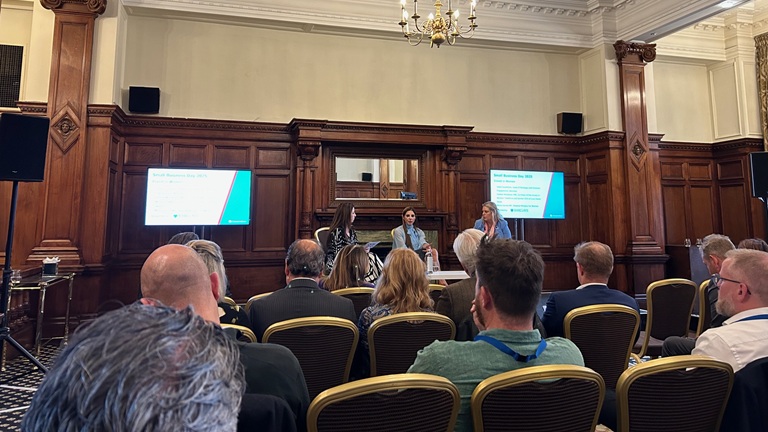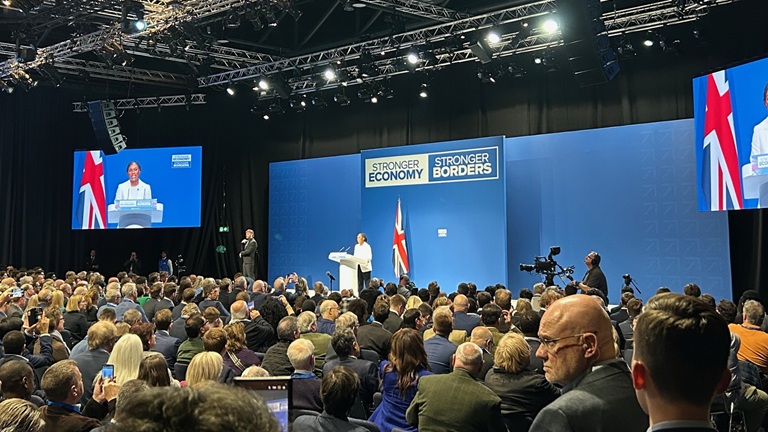Behind the scenes at the Conservative Party Conference 2025
)
Posted: Mon 6th Oct 2025
Manchester was the stage for this year's Conservative Party Conference, and it carried the mood of a party trying to reset.
Enterprise Nation attended to bring the small business voice directly into those conversations and test how the opposition's economic plans line up with founders' real experiences.
Across the debates, speeches and roundtables, one question dominated: how to restore confidence, investment and stability for small businesses.
The Invest in Women Taskforce panel session
Chair: Juliet Gouldman, head of strategic and external engagement at Barclays
Panellists: Debbie Wosskow OBE, co-chair of the Invest in Women Taskforce and former CEO of Love Home Swap; Mims Davies MP, Shadow Minister for Women
Here, the message was clear: empowering women is central to economic growth.
On average, female-led firms generate 35% higher returns on investment (ROI), yet only 2% of the UK's venture capital goes to women.
Despite a £385 million fund having been created to back female-led businesses in the UK, barriers remain at every stage.
Speakers highlighted that the average female-run business employs only its founder, underlining how hard scaling can be.
Confidence and networks were recurring themes – many women "rule themselves out" of opportunities before they even apply.
After COVID, female-owned firms were among those hit hardest, with many founders now considering leaving the UK due to high costs, limited opportunities for finance, and bureaucracy.
The panel called for a national campaign to promote EIS (Enterprise Investment Scheme) and SEIS (Seed Enterprise Investment Scheme) – which remain largely unknown to female founders – alongside education for investors and stronger female angel networks.
Local obstacles were also discussed, from childcare and parking charges to the lack of targeted support for single parents.
The overarching message was that women's economic empowerment starts with treating them as business leaders, not diversity data points. Progress will depend on:
clearer, simpler access to tax-efficient investment schemes
visible success stories to inspire others
a business environment that recognises and supports women's realities

Fireside discussion with Mel Stride MP: Fiscal responsibility and "popular capitalism"
Shadow Chancellor Mel Stride MP made the case for what he called "popular capitalism": a return to stable finances and predictable policy. Without that, he warned, Britain risks a bond market crisis.
The figures he cited were stark:
national debt approaching 100% of GDP
inflation running higher than peers
a civil service swollen from 365,000 before the pandemic to 515,000 today
Welfare costs were singled out, with over three million people on long-term sickness or disability benefits. Fixing inefficiencies in that system, he said, could save between £15 billion and £35 billion.
Stride's wider prescription combined classic prudence with pro-growth reform:
Lower taxes on work, investment and enterprise
Simpler rules to remove "cliff edges"
Pension funds investing more in UK firms
Succession-friendly policies to encourage multi-generational business ownership
On the future economy, Stride was upbeat about technology. He claimed AI could boost GDP by 10% within five years, flattening debt projections and lifting productivity, provided the education system keeps pace to recreate the jobs that AI displaces.
Through our Tech Hub programme, we've long called for priority to be given to making sure more businesses adopt AI.
Stride cast this as a plan to restore confidence for investors and entrepreneurs: predictable policy, leaner government and smarter spending.
Baron Sharpe of Epsom: Freeing businesses to take risks
In his keynote, Baron Andrew Sharpe, Shadow Minister for Business and Trade, argued that regulation and over-management are stifling enterprise.
He relayed complaints from local chambers of commerce about the lack of a single, government-funded business support programme. He warned that the UK's "route to market and route to exit" have both become far harder than a decade ago.
Sharpe pointed to Milan, Madrid and Dubai, where governments "stay out of the way", as examples of how to make a country internationally attractive again. "Giorgia Meloni has made Italy somewhere British founders now want to do business," he said, which is "something unheard of before".
His wider point was cultural: the UK has lost its appetite for risk. One panellist noted that "Amazon didn't make a profit for 10 years", a level of patience almost unthinkable in Britain.
Sharpe also called for financial management and entrepreneurial education in schools, to equip the next generation to create jobs, not just apply for them.
Kemi Badenoch MP: Values, unity and renewal
In the conference hall, Kemi Badenoch opened her leader's speech with a moving tribute to Manchester's Jewish community, tracing its roots back to the 1780s.
Referring to the recent attack on Heaton Park synagogue, she called it "an attack on British values themselves".
Her theme was national unity through shared values – personal responsibility, freedom of thought and belief in liberty under law. Britain, she said, should be "multi-racial but not multicultural".
Badenoch acknowledged past Conservative mistakes on economic management and promised "credible, disciplined planning" in future. Her pledges included:
a five-point border plan, with annual deportations of up to 150,000 illegal migrants
leaving the European Court of Human Rights and repealing the Human Rights Act to restore parliamentary control
prioritising British citizens in housing and services
cutting bureaucracy and rewarding hard work to rebuild the economy

Rapid-fire roundtables: What small firms want next
I joined two rapid-fire roundtables hosted by:
Harriett Baldwin MP, Member of Parliament for West Worcestershire and Member of the Treasury Select Committee
Alison Griffiths MP, Member of Parliament for Bognor Regis and Littlehampton and Member of the Business and Trade Select Committee
At Griffiths' table, founders made an urgent plea to champion British businesses through a national Buy British campaign. "Too many people don't even know what's made here," one attendee said. Access to finance and high energy bills were repeatedly cited as major barriers to growth.
Baldwin's session mentioned Barclays research that suggested the UK could unlock £60 billion in growth if small businesses invested at the same rate as larger ones.
Yet rising National Insurance costs for employers and the forthcoming Employment Rights Bill were said to be making it "costlier and riskier" for small firms to hire.
One proposal stood out: raising the age threshold for employer National Insurance contributions to 25. This, attendees argued, would reduce hiring costs for small firms while tackling unemployment among young people.
Across both discussions, founders spoke frankly about red tape, costs and confidence – themes that echoed across the conference.
The takeaway
This year's Conservative Party Conference was more grounded than glamorous. The rhetoric around enterprise was strong, but the consistent thread was a search for stability, in fiscal policy, investment and public trust.
For Enterprise Nation, the conversations reinforced what we hear daily from our members: small firms want simplicity, visibility and fair conditions to grow.
Whether through investment education for women, tax reform for founders or energy support for local traders, the next phase of small business policy must deliver on those fundamentals.
Set against Labour's conference the week before, the contrast in tone and approach was clear. Labour's message was one of delivery and renewal, a government shifting from repairing the past to proving it can deliver change.
Ministers talked about implementation, regional investment, skills reform and long-term finance through measures such as the National Wealth Fund and pension reform. The emphasis was on an active state driving growth, with stability and partnership at its core.
The Conservatives, by contrast, were focused on reset and reassurance, rebuilding confidence through fiscal discipline, lower taxes and a lighter regulatory touch.
Their message was that growth comes from freeing enterprise, not directing it: empowering women founders, cutting bureaucracy and restoring the appetite for risk.
Both parties spoke the language of stability, but from different vantage points. Labour's was state-enabled renewal; the Conservatives' was market-led restraint.
Read more of the latest business and policy news on Enterprise Nation
Get business support right to your inbox
Subscribe to our newsletter to receive business tips, learn about new funding programmes, join upcoming events, take e-learning courses, and more.
Start your business journey today
Take the first step to successfully starting and growing your business.
Join for free

